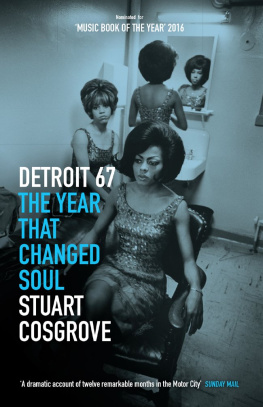Embracing a City
The Kresge Foundation in Detroit
19932017
Tony Proscio and Myron Farber
Copyright 2018
The Kresge Foundation
3215 W. Big Beaver Road
Troy, MI 48084
Kresge.org
ISBN: 978-0-9839654-7-3
eISBN: 978-0-9839654-9-7
All Rights Reserved
No part of this book may be used or reproduced without formal permission from The Kresge Foundation.
Book Design: Meaghan Barry and Lilian Crum of Unsold Studio
Cover Art: Installation view Neighborhood Detroit, a commissioned artwork for The Kresge Foundations midtown Detroit Office
Artist Credit: Clinton Snider
Photo Credit: Tim Thayer Photography
Table of Contents
Major foundations occupy a unique place in modern American society. Often guided by the most general of mission statements (in the case of the Kresge Foundation, it is to promote human progress), these institutions stand astride the other spheres of more specialized human activities: governmental, commercial, academic, educational, religious, journalistic, and civic. The most important question any foundation faces, therefore, is what role will it assume in relation to the constellation of actors in these other spheres? Should it be solely supportive, taking the world as it is and awarding grants to enhance the capacity of worthy institutions to operate in their spheres? Should it deploy the foundations resources to influence, even reform, how other actors behave? Or, most dramatically, should the foundation develop its own agenda for making an impact in the world and then identify the actors best able to serve as partners in implementing that vision?
These are not easy issues to resolve. Faced with the distinctive challenges ccompanying each approach, we have seen a trend over the past half century for foundations to elect the more activist, purposive role. The decision to pursue that ambitious direction, however, carries with it a variety of significant pitfalls. The first is the debilitating belief that your vision and approach are always correct, a bias often confirmed by resource-limited applicants all too ready to validate your wisdom. Related to this concern, it is easy to squander the foundations precious resources by promoting actions that end up being of limited consequence, a mistake to be avoided at all costs given the many urgent problems we face. And, finally, there is the familiar institutional misstep of veering from one problem to the next, as new boards and presidents come and go each with their own individual pet missions.
A truly great modern foundation must live comfortably in all three possible realms. Most of all, it must understand that it has the advantage of being able to develop a very special kind of knowledge about the world and its needs but that it will only succeed by working collaboratively with other institutions and actors, who generate their own distinctive knowledge. Moreover, working collectively is the only way to magnify available resources, financial and otherwise, at a scale comparable to the challenges to be met. The good foundation recognizes in its heart that to be truly effective, it must operate on the principle that the world would be better off if the foundation were eventually able to disappear from the scene.
When the Kresge Board of Trustees appointed Rip Rapson as President in 2006, the Kresge Foundation was at the beginning of its journey as a modern foundation of great consequence. Rip led the transition of the then eight-decade-old institution in a way that will make all those involved with the Kresge Foundation forever proud. The exquisitely complex and highly delicate balance that was required to fulfill the Foundations goals was met with a continuous interaction of vision, experimentation, and self-criticism. This work was conducted in the context of the deeply distressed and magical City of Detroit, with quite stunning and, we hope, ultimately joyous results.
As Edmund Burke said, To be attached to the subdivision, to love the little platoon we belong to in society, is the first principle (the germ as it were) of public affections. The subdivision, the platoon, Kresge chose to belong to, first and foremost, was Detroit. This volume is the story of one major American foundation finding its way in the modern landscape of foundations and of how, with many partners, it could promote human progress in its home of Detroit.
Lee Bollinger
President of Columbia University in the City of New York, and former Kresge Foundation Trustee (20012017)
The research and writing of this book were supported by The Kresge Foundation. The Foundation also provided generous access to its records, archives, staff, and grantees. Nonetheless, the authors retained editorial control, and any errors or omissions are solely their responsibility.
The information presented here comes from three main sources. The first is an exhaustive review of The Kresge Foundations written record on its efforts in Detroit, including strategy papers, annual reports, staff memos, speeches and publications by Kresge executives, grant recommendations, and periodic program reviews and assessments. These documents amount to many thousands of pages in all. The second source of information is roughly four dozen interviews with civic, philanthropic, and community leaders and Detroit residents, and with members of Kresges Detroit staff. Some of these interviews were conducted on the condition that the source not be identified. Wherever the source of a quotation is not otherwise noted, it came from one of these interviews. A third source of information was media coverage of Detroit and its efforts at recovery, including news publications and online and social media. Most of this text was written between January 2016 and November 2017, a time of change and challenge in Detroit. There is no reason to believe that these changes have ended, or even have slowed. Therefore, many statements throughout this history must be understood as snapshots of a particular moment and reflections on a recent past that will remain open to interpretation and re-interpretation long after these pages are published.
The text of this book was expertly edited, and in a great many places improved, by Merrill Perlman, an award-winning editor and journalist. The process of assembling and interpreting the documents, hunting down facts, and locating interviewees was aided enormously by Kresges Detroit team, particularly its former Managing Director Laura J. Trudeau, and its current Managing Directors, Wendy Lewis Jackson and Benjamin S. Kennedy, as well as former Senior Program Officer George C. Jacobsen and Program Officers Bryan P. Hogle and Neesha B. Modi. Senior Communications Officer W. Kim Heron offered valuable insight, and Marcus L. McGrew, director of Program Operations and Information Management, fielded multiple requests for data and helped with their interpretation.
Throughout the long months of research and writing, Senior Program Team Assistant Krista Lowes and former Detroit Office Fellow Alycia Socia endured constant requests for advice, documents, contact information, and internal resources at the Foundation, always responding with skill, patience, and grace and, most remarkably, without complaint.
Rip Rapson, president of The Kresge Foundation. Photo Credit: Steve Cohn Photography










